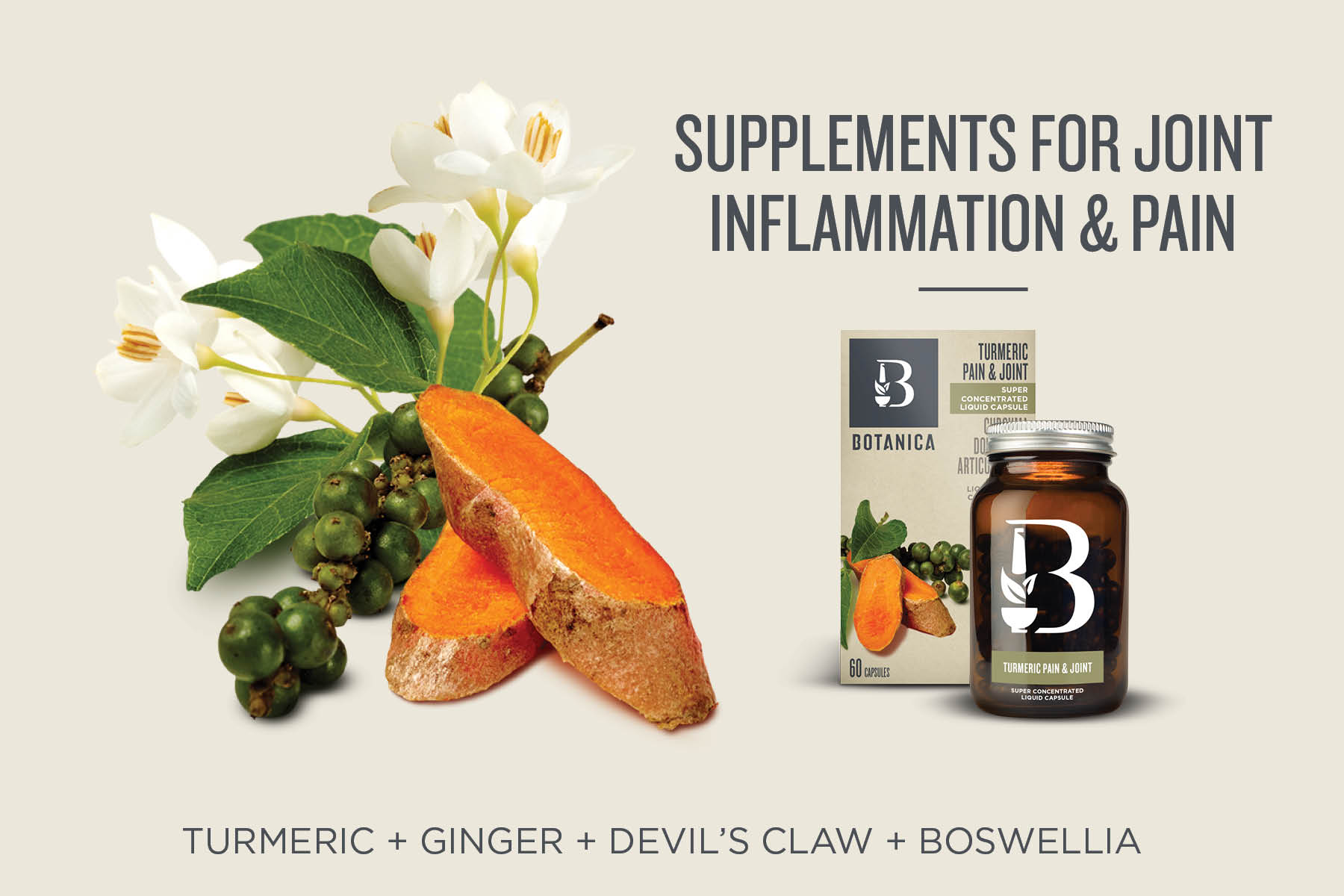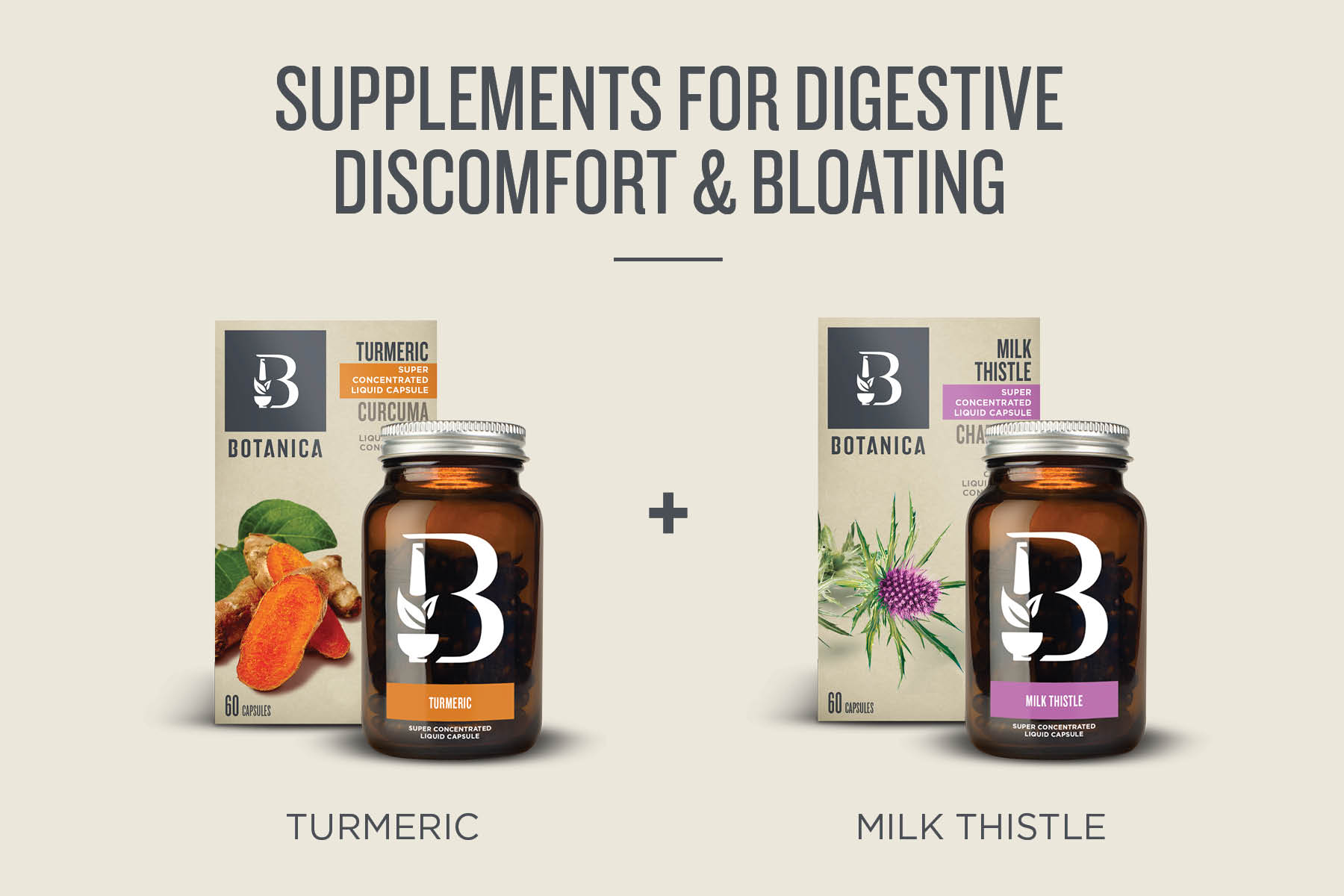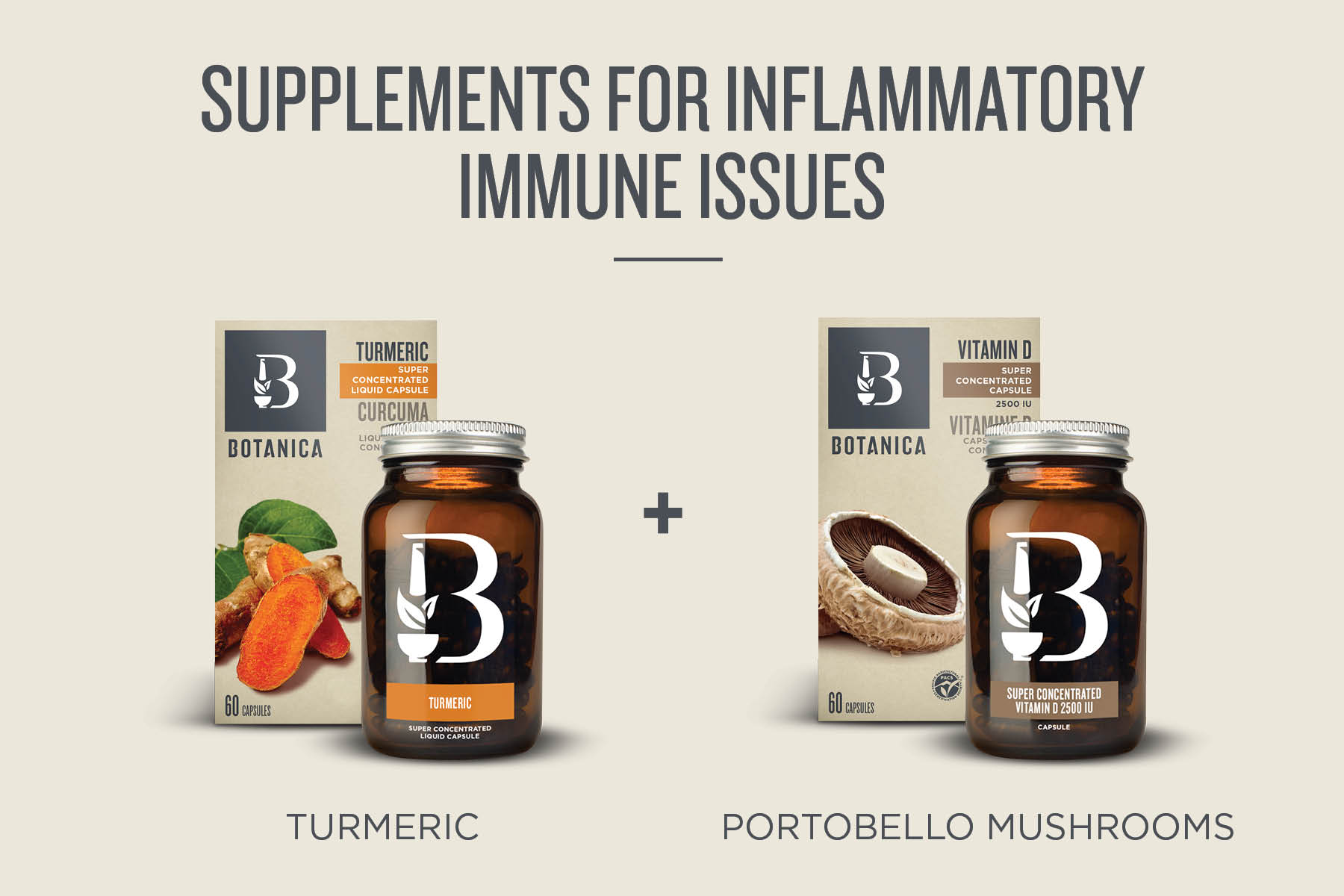The sore neck and shoulders, the bloating, the anxiety…these can all be indicators of chronic inflammation and the need for some herbal and nutritional anti-inflammatory supplements to get you feeling tip-top again!
What is inflammation?
Inflammation is part of the immune response to trauma or infection. When there is damage to any part of the body it’s up to the immune system to repair the damage, and inflammation is part of that process. A twisted ankle or a virus multiplying in our throat stimulates the immune system. The cells lining the blood vessels move apart a little in order to let white blood cells move out of the blood to reach the damaged area. This makes the area look red and swollen, and to feel hot and painful – the classic signs of inflammation. [1]
Once the white blood cells have dealt with the infection or the hurt tissue, they gobble up dead cells to clear the area, and then a different group of cells are able to come in and create new, healthy tissue and we carry on our merry way feeling healthy and mobile again.
Without inflammation, the sprained ankle would stay damaged or the virus would be able to replicate unchecked in our throats and extend the infection to more and more tissues.
What happens when inflammation becomes chronic?
The problem with inflammation is when the healthy acute response lingers and becomes a chronic issue. The key to a balanced, healthy, well-functioning immune system is the ability to spike inflammation when needed and then to fully extinguish it once the threat has passed. A low smoulder of inflammation that never fully resolves is when inflammation becomes a problem for the body.
Some white blood cells kill infectious agents by creating damaging compounds called reactive oxygen species or ROS. These are the classic double-edged sword in that they are necessary for destroying microbial invaders (viruses, bacteria, yeast), but they can also damage our own healthy cells. In a well-run immune response, the ROS are released and then antioxidants from our diet or our body neutralize the ROS and protect our healthy cells from chronic exposure. [2]
With long-term inflammation, however, there can be ongoing oxidative stress on the body. So apart from the potential pain from chronic inflammation, there are possible risks to the body in the form of liver disease, cardiovascular disease, and damage to nerves. Many of the diseases associated with long-term chronic inflammation are those that are considered to be more “Western diseases” in that they are associated with affluence and lifestyle choices rather than with infection or malnutrition. These include diabetes, cardiovascular disease, Alzheimer’s, and autoimmune disorders such as rheumatoid arthritis. [1] [2]
Symptoms of chronic inflammation are broad and variable, ranging from mood disorders (anxiety, depression), fatigue, lack of appetite, low libido, poor blood sugar regulation, and/or disordered sleep. [1] [2]
What can I do to fight inflammation?
There are many tools that we can engage to fight inflammation and reclaim our best selves! Part of the myriad of health benefits that come from a diet rich in fruit and vegetables is the range of antioxidant compounds that they provide. From vitamins such as vitamins C and E, to minerals like selenium, and phytonutrients (literally “plant-nutrients”) including polyphenols and carotenoids, the plant kingdom is a vast repository of molecules to help us quench oxidative stress. [2]
Turmeric’s anti-inflammatory properties
Turmeric has a key role in reducing inflammation in our bodies. Not only is it rich in antioxidants but it also contains anti-inflammatory compounds. [3] Curcuminoids are considered to the be active ingredient turmeric, but they are just one group of many amazing compounds found in turmeric and notoriously difficult to absorb across the digestive tract. [3] Turmerones, also found in turmeric, appear to improve the bioavailability of curcuminoids. [4] Research into “curcumin-free turmeric” or CFT has also shown that the anti-inflammatory properties of turmeric are not limited to curcumin alone. [5]
Turmeric is so well researched that many anti-inflammatory supplements contain this beautiful, golden spice. Not only do turmerones and compounds present in turmeric work synergistically with curcuminoid to improve absorption and anti-inflammatory effects within the body but black pepper has also been shown to enhance the bioavailability of turmeric. [3]
It’s easy to add turmeric to foods as part of a healthy daily routine. It is best consumed with fat to maximize absorption of the medicinal compounds. Soups, stews, curries, smoothies, and salad dressings are all great vehicles for increasing turmeric consumption. A daily routine of golden milk in which turmeric, and other spices if desired, are added to milk (plant-based or dairy) is also helpful.
Where do anti-inflammatory supplements come in?
If chronic inflammation is affecting quality of life, then taking concentrated turmeric as an anti-inflammatory supplement may be necessary for a while. Botanica offers a Turmeric Golden Mylk powder with almost 2 grams of whole, organic turmeric in each serving. For those who find capsules more convenient, Botanica has some wonderfully unique capsule offerings.
Botanica’s Turmeric Liquid Capsules are a great choice for general, chronic inflammation. Digestive upset, overall achiness, early signs of a “Western disease” (excess weight, poor blood sugar regulation, increasing cholesterol levels, mood imbalances), or suspected oxidative stress (poor diet, toxic exposure) all could benefit from whole turmeric along with other nutritional, medical, and lifestyle interventions. Botanica capsules are super concentrated liquid capsules, that offer a wide range of water, alcohol, and fat-soluble compounds, concentrated into a single vegan friendly capsule.
For overt joint or muscle pain, however, Botanica’s Turmeric Pain and Joint Liquid Capsules would be more appropriate, as they contain Boswellia, a herb that directly blocks one of the key pathways that promotes inflammation. [6] This amazing blend also contains quercetin, a bioflavonoid from plants that also has anti-inflammatory properties [7], devil’s claw, a plant that reduces inflammation and pain [8], ginger, a close cousin of turmeric that has its own anti-inflammatory and antioxidant effects [9], as well as black pepper to support the bioavailability of turmeric.

What else can I do to regulate inflammation in my body?
Adjunctive support for inflammation can be tissue or system specific. For digestive issues (bloating, pain, variable stools, heartburn) or lab markers indicating the development of fatty liver disease, consider combining Botanica’s Milk Thistle Liquid Capsules with the Turmeric Liquid Capsules to increase the flow of bile and bring powerful antioxidant support to the ever-important, blood-cleansing liver. [10]

For overall immune support, be that chronic inflammation, frequent infections, or an autoimmune disorder, you may need additional vitamin D along with your regular anti-inflammatory supplements. Botanica offers vegan Vitamin D Capsules made from organic portobello mushrooms in both 1000 IU and 2500 IU dosages.

Omega-3 fatty acids from sustainably caught or harvested cold-water fish, algae, or flax are also key to include for overall health benefits including regulation of inflammation. The omega-3 fatty acids are the precursor molecules (think LEGO blocks) for building anti-inflammatory molecules in the body. It’s difficult to get enough omega-3 fatty acids from diet alone, so supplementation is important. The Perfect Omega from Botanica is a clean, sustainably sourced omega 3 oil from small fish that is emulsified to make it more absorbable (no fishy burps!) and deliciously creamy.
Diet and digestion is the foundation of our health. All of our cells are either made from something that we ate or something that our mother ate! Aim for half of each meal to be plant-based and colourful. Put away distractions, chew well, eat mindfully noting the range of flavours and textures in your food, and avoid snacking. The digestive tract needs time to self-clean in between meals. Seek the advice of a health care professional as needed to help guide you on your journey to optimal wellness!
Disclaimer: The information provided is intended for informational purposes only and is not intended as a substitute for professional medical advice, diagnosis, or treatment. Always seek the advice of your physician or other qualified healthcare provider with any questions you may have regarding a medical condition.
References:
[1] Furman D, Campisi J, Verdin E, Carrera-Bastos P, Targ S, Franceschi C, Ferrucci L, Gilroy DW, Fasano A, Miller GW, Miller AH, Mantovani A, Weyand CM, Barzilai N, Goronzy JJ, Rando TA, Effros RB, Lucia A, Kleinstreuer N, Slavich GM. Chronic inflammation in the etiology of disease across the life span. Nat Med. 2019 Dec;25(12):1822-1832. doi: 10.1038/s41591-019-0675-0. Epub 2019 Dec 5. PMID: 31806905; PMCID: PMC7147972.
[2] Tarique Hussain, Bie Tan, Yulong Yin, Francois Blachier, Myrlene C. B. Tossou, and Najma Rahu. Oxidative Stress and Inflammation: What Polyphenols Can Do for Us? https://www.hindawi.com/journals/omcl/2016/7432797/
[3] Hewlings SJ, Kalman DS. Curcumin: A Review of Its Effects on Human Health. Foods. 2017 Oct 22;6(10):92. doi: 10.3390/foods6100092. PMID: 29065496; PMCID: PMC5664031.
[4] Yue GG, Cheng SW, Yu H, Xu ZS, Lee JK, Hon PM, Lee MY, Kennelly EJ, Deng G, Yeung SK, Cassileth BR, Fung KP, Leung PC, Lau CB. The role of turmerones on curcumin transportation and P-glycoprotein activities in intestinal Caco-2 cells. J Med Food. 2012 Mar;15(3):242-52. doi: 10.1089/jmf.2011.1845. Epub 2011 Dec 19. PMID: 22181075; PMCID: PMC3282471.
[5] Aggarwal BB, Yuan W, Li S, Gupta SC. Curcumin-free turmeric exhibits anti-inflammatory and anticancer activities: Identification of novel components of turmeric. Mol Nutr Food Res. 2013 Sep;57(9):1529-42. doi: 10.1002/mnfr.201200838. Epub 2013 Jul 12. PMID: 23847105.
[6] Siddiqui MZ. Boswellia serrata, a potential antiinflammatory agent: an overview. Indian J Pharm Sci. 2011 May;73(3):255-61. doi: 10.4103/0250-474X.93507. PMID: 22457547; PMCID: PMC3309643.
[7] Li Y, Yao J, Han C, Yang J, Chaudhry MT, Wang S, Liu H, Yin Y. Quercetin, Inflammation and Immunity. Nutrients. 2016 Mar 15;8(3):167. doi: 10.3390/nu8030167. PMID: 26999194; PMCID: PMC4808895.
[8] Gxaba N, Manganyi MC. The Fight against Infection and Pain: Devil’s Claw (Harpagophytum procumbens) a Rich Source of Anti-Inflammatory Activity: 2011-2022. Molecules. 2022 Jun 6;27(11):3637. doi: 10.3390/molecules27113637. PMID: 35684573; PMCID: PMC9182060.
[9] Mashhadi NS, Ghiasvand R, Askari G, Hariri M, Darvishi L, Mofid MR. Anti-oxidative and anti-inflammatory effects of ginger in health and physical activity: review of current evidence. Int J Prev Med. 2013 Apr;4(Suppl 1):S36-42. PMID: 23717767; PMCID: PMC3665023.
[10] Serçe A, Toptancı BÇ, Tanrıkut SE, Altaş S, Kızıl G, Kızıl S, Kızıl M. Assessment of the Antioxidant Activity of Silybum marianum Seed Extract and Its Protective Effect against DNA Oxidation, Protein Damage and Lipid Peroxidation. Food Technol Biotechnol. 2016 Dec;54(4):455-461. doi: 10.17113/ftb.54.04.16.4323. PMID: 28115903; PMCID: PMC5253978.
